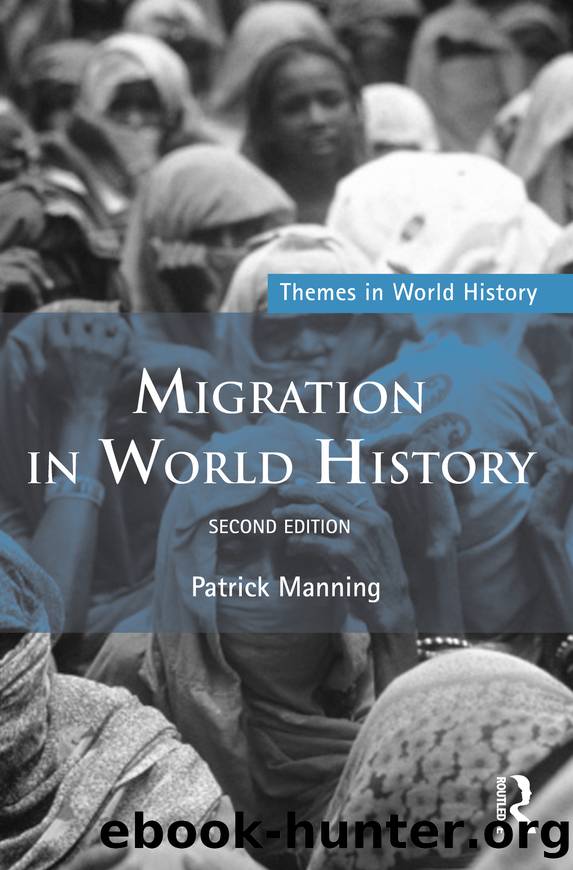Migration in World History by Manning Patrick; & Tiffany Trimmer

Author:Manning, Patrick; & Tiffany Trimmer [Patrick Manning]
Language: eng
Format: epub
ISBN: 1046904
Publisher: Routledge
Chapter 7
Spanning the oceans, 1400 to 1700
Over the course of human history, the shifts in available technology have sometimes favored life on dry land, and at other times life at waterâs edge. The period after 1400 brought a dramatic advance in maritime technology, and expanded human population and activities at the edge of the seas. All of the worldâs seagoing populations, but especially the Chinese, Arabs, and western Europeans, expanded their horizons and improved their navigational techniques. The result changed the paths of human contact permanently. While the land roads continued to bear most of the worldâs traffic, the sea lanes expanded greatly in importance.
Improved maritime technology enabled individual humans at last to succeed in spanning the globe. The opening of new routes brought exciting adventures and encounters, but it also brought disasters. Warfare and conquest brought the end to old regimes, and economic changes brought riches to some and despair to many more. Most significantly, the encounters were not only among people, but also included the diseases they bore and encountered along the newly opened routes. The spread of epidemic disease to unprotected populations brought massive loss of life and decline of population in the sixteenth and seventeenth centuries, especially throughout the Americas, where the population in 1650 had fallen to a scant five to ten million persons â as little as one-tenth of what it had been in 1500. Less disastrous but still serious population declines took place in parts of Europe, Africa, and Asia in this era. Mortality rates for every population rose in this age of encounter, and especially for travelers.
The character of life in each of the major ocean basins changed significantly, and the differences between them became more evident, as they entered into regular contact with each other. The Indian Ocean was the best traveled and most cosmopolitan of the oceans, as its long tradition of being criss-crossed by vessels launched from near and far was expanded into even denser trade. The Atlantic Ocean, where small numbers of vessels had hugged its shores, came to be crossed frequently, but with shipping dominated by Europeâs maritime powers. The Pacific Ocean, by far the greatest watery expanse, continued to be traveled busily by large vessels along its western shore and small vessels in its southern archipelago, and also came to be linked to the Americas by the slender but significant thread of Spanish vessels.
The new shape of the world in this maritime age oriented West Africa toward the Atlantic and East Africa toward the Indian Ocean, while North Africa remained oriented toward the Mediterranean. The new sea routes put China and India in easier contact with each other and with Europe. By the same token, China and India entered into contact with the Americas and, indirectly, with the western shore of Africa. The numbers of people involved in these migrations rarely exceeded the several hundred people who could sail in a fleet of ships, yet the cumulative influence of maritime migrations over three centuries did much to change the world.
Download
This site does not store any files on its server. We only index and link to content provided by other sites. Please contact the content providers to delete copyright contents if any and email us, we'll remove relevant links or contents immediately.
| Africa | Americas |
| Arctic & Antarctica | Asia |
| Australia & Oceania | Europe |
| Middle East | Russia |
| United States | World |
| Ancient Civilizations | Military |
| Historical Study & Educational Resources |
Magic and Divination in Early Islam by Emilie Savage-Smith;(1452)
Ambition and Desire: The Dangerous Life of Josephine Bonaparte by Kate Williams(1276)
Papillon by Henry Charrière(1260)
Bohemians, Bootleggers, Flappers, and Swells: The Best of Early Vanity Fair by Bohemians Bootleggers Flappers & Swells- The Best of Early Vanity Fair (epub)(1257)
Twelve Caesars by Mary Beard(1136)
Operation Vengeance: The Astonishing Aerial Ambush That Changed World War II by Dan Hampton(1110)
What Really Happened: The Death of Hitler by Robert J. Hutchinson(1066)
London in the Twentieth Century by Jerry White(1049)
Time of the Magicians by Wolfram Eilenberger(1027)
Twilight of the Gods by Ian W. Toll(1021)
The Japanese by Christopher Harding(1018)
Lenin: A Biography by Robert Service(981)
The Devil You Know by Charles M. Blow(930)
Freemasons for Dummies by Hodapp Christopher;(889)
A Social History of the Media by Peter Burke & Peter Burke(883)
Napolean Hill Collection by Napoleon Hill(860)
The Churchill Complex by Ian Buruma(857)
The Rise and Triumph of the Modern Self by Unknown(852)
Henry III by David Carpenter;(847)
